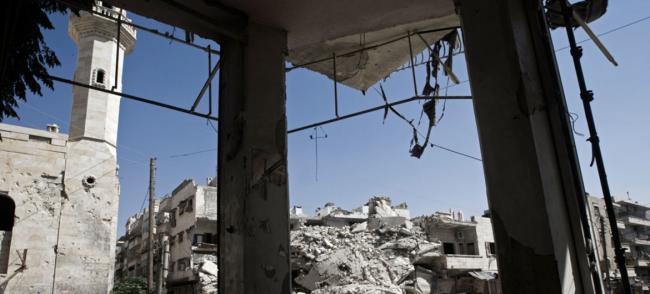
‘Marathon of suffering’ in Syria conflict, far from over: UN humanitarian adviser
New York, May 4 (IBNS): The fighting in Syria “is not over” and neither is the “marathon of suffering” for millions of people in the war-torn country, a senior aid official at the UN said on Thursday.
Jan Egeland, Special Adviser to the UN Special Envoy for Syria, was speaking to journalists after a scheduled humanitarian task force meeting in Geneva.
“It’s not over, and that’s what I fear, people think it’s over,” he said, amid reports that “tens of thousands of people” from Rural Damascus were preparing to evacuate to Idlib in the north-west of the country.
“We’ve still only 23 per cent of humanitarian programmes funded and we’re now in May,” Egeland said, warning that there was “no cash …available to humanitarian actors” as “desperate, exhausted people arrive now every day in Idlib. There is no money for the operations.”
He called on countries not to slow down their support “before this marathon of suffering is over.”
Egeland’s comments come amid ongoing aid-access challenges, in many areas of Syria, linked to mass displacement and acute needs caused by more than seven years of war.
Today, two million people remain in hard-to-reach areas in Syria and 11,000 still live in besieged locations; but the apparent progress in terms of numbers, is deceptive, the UN Special Advisor explained:One year ago, well over four million people lived in so-called hard-to-reach locations where aid access was extremely unreliable, and hundreds of thousands more were trapped by surrounding forces.
“It is a good thing that people are not any longer living massively in besieged areas, and that much fewer people live in hard-to-reach areas. But when this comes at the cost of horrific battles in heavily populated areas, and when it comes because of agreements made by a small group of military people and politicians, too often humanitarian concerns and the protection concerns for the civilian population is lost.”
According to the UN Office for the Coordination of Humanitarian Affairs (OCHA), displacement in some parts of Syria is as high as it was at the beginning of the crisis.
OCHA’s records indicate that for every person who returns home voluntarily, another three people are newly displaced.
Areas of particular concern include Afrin in the north, the former ISIL stronghold of Raqqa, as well as Eastern Ghouta outside Damascus and Yarmouk in the south of the capital - where the UN has highly-restricted access.
But Egeland said his “worry number one” was Idlib, which is already home to more than two million people.
“They are living out in the open, they are living in congested displacement camps…crammed in collective centres,” he said.
“They arrive at 2am, you know, sort of every night now, just to find that they can hardly get a bed anywhere offered by completely overwhelmed humanitarian actors. So we cannot have a war in Idlib,” he implored.
Amid reports that armed groups are continuing to strike what Egeland called “bad humanitarian agreements” to allow civilians to leave several conflict zones including the besieged Shia towns of Foah and Kafraya in the north-west and Yarmouk south of Damascus, he said it was important that people went to a place of their choosing.
Egeland also expressed concern for the 40,000 people living in displacement camps near eastern Ghouta – previously home to 390,000 people - amid a reported lack of freedom of movement for civilians, particularly men.
The veteran aid chief also defended the value of the UN-coordinated “deconfliction system” which offers protection to humanitarian locations whose location is communicated to warring parties.
More than 660 sites had now asked the UN to transmit their coordinates to Member States whose militaries are operating within Syria, Egeland said, and more than 500 of those requests had come this year alone.
“I’m surprised really by those who say they really want to help protect medical facilities, that they are questioning the whole value of trying to get a deconfliction system up in the Syria war, like we have it in Yemen, we have it in Afghanistan, we have it in Mali and many other conflicts,” he added.
UNICEF/Giovanni Diffidenti
Support Our Journalism
We cannot do without you.. your contribution supports unbiased journalism
IBNS is not driven by any ism- not wokeism, not racism, not skewed secularism, not hyper right-wing or left liberal ideals, nor by any hardline religious beliefs or hyper nationalism. We want to serve you good old objective news, as they are. We do not judge or preach. We let people decide for themselves. We only try to present factual and well-sourced news.







